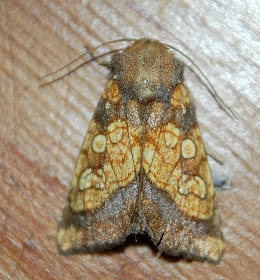Most are common plants and expected, just haven't had time to check them and photo for identification.
These were all found on or close to Westland Green, along with good amount of bird's foot trefoil and knapweed.
 |
| Yellow loose-strife |
 |
| Great mullien |
 |
| Common fleabane |
 |
| Hoary ragwort |
 |
| Red bartsia |
 |
| Silverweed |
 |
| Yarrow |
 |
| Marsh cudweed |
 |
| Lesser marsh grasshopper |
 |
| dark bush cricket |
 |
| Agriphila straminella |
On the moth front, only new species for the year list were a spectacularly marked frosted orange and a spruce carpet. In all 22 moths of 13 species this morning, so the total garden list of moths now moves to 2987 individuals, with 182 macro species and 124 micros for the year.
 |
| frosted orange |
 |
| spruce carpet |

Nice photos as ever. Flower is Red Bartsia not bastria. Yarrow looks more like its close relative Sneezewort + the grasshopper is Lesser Marsh not Common Green (note the parallel doral keelson thorax). Hope I don't come across as a knitpicker!
ReplyDeleteThanks for the corrections. Poor photo of yarrow but I noted the leaves were very fine and divided, unlike the undivided ones found on sneezewort.
ReplyDeleteWasn't sure on the hopper, so good to get a new species.